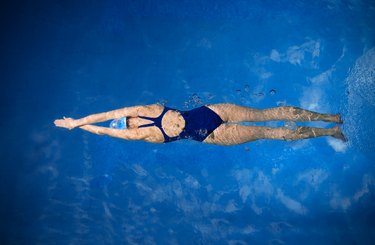
Swimming can be a great way to improve overall health and cardiovascular fitness. You can measure your heart rate in water manually or use a monitor to ensure you are getting just the right kind of workout, whether a warm up, moderate intensity, vigorous intensity or a combination of the three.
Your Heart Rate in Water
Video of the Day
According to the US Department of Health & Human Services' Physical Activity Guidelines for Americans, 2nd edition, "adults should do at least 150 minutes to 300 minutes a week of moderate-intensity, or 75 minutes to 150 minutes a week of vigorous-intensity aerobic physical activity," or the equivalent in a combination of the two.
Video of the Day
Swimming can be an excellent activity for cardio exercise that differs in a number of important ways from running, cycling and other land-based workouts. According to Harvard Health, both the horizontal position of your body and submersion in water mean that blood is less likely to pool in the legs, causing it to return more efficiently to the heart, potentially increasing stroke volume (the amount of blood pumped out of the left ventricle with each beat). Swimming also relieves joint pain and increases flexibility.
To check your heart rate in water, you will need to either wear a waterproof heart rate monitor — either a specialty device, or one included in a smartwatch or fitness tracker — or you will need to quickly check your pulse with your fingers while you are stopped between laps. To check your heart rate manually, says Harvard Health, lightly press the side of your neck just below your jawbone and watch the clock, counting the number of beats over the next 15 seconds. Multiply the resulting number by four to get your heartbeats per minute.
Aerobic Training vs Weight Bearing
In Your Guide to Physical Activity and Your Heart published by the US Department of Health & Human Services, experts say: "The most healthful activity level uses 50 to 75 percent of your maximum heart rate." Below 50 percent of your maximum heart rate is generally not strenuous enough to see significant cardiovascular health benefits, while going above 75 percent is going to cause too much stress on the body. Find your maximum heart rate by subtracting your age from 220, and consult a doctor to confirm before starting a new exercise routine.
Swimming might be one of the best aerobic exercises for overall cardiovascular health, according to research out of the Cooper Clinic in Dallas, published in August 2008 and May 2009 in the International Journal of Aquatic Research and Education. These comprehensive landmark studies showed that swimming was correlated with a number of positive health outcomes. Swimmers and runners had the best overall blood pressure and cholesterol levels when compared to walkers and non-exercisers. While swimming and running were on par in this first study, a second showed that swimmers had a significant advantage over runners and others when it came to avoiding early death.
It is important to remember that while swimming is an excellent aerobic exercise that can also offer strength training benefits, it is not a weight-bearing exercise like walking or running, as mentioned in the Harvard Health article. Weight-bearing exercises aid in bone health. The National Institutes of Health suggest doing 30 minutes of weight-bearing exercises daily, ideally every day of the week. Talk to an expert to help come up with a personalized swimming exercise plan that will work for you.
- US Department of Health & Human Services: "Physical Activity Guidelines for Americans, 2nd edition"
- Harvard Health: "Take the Plunge: Try a Water Workout"
- Harvard Health: "Dive Into a Swimming Regimen"
- Harvard Health: "Want to Check Your Heart Rate? Here's How"
- US Department of Health & Human Services: "Your Guide to Physical Activity and Your Heart"
- International Journal of Aquatic Research and Education: "Swimming and All-Cause Mortality Risk Compared With Running, Walking, and Sedentary Habits in Men"
- International Journal of Aquatic Research and Education: "Swimming Exercise: Impact of Aquatic Exercise on Cardiovascular Health"
- Cleveland Clinic: Pulse and Target Heart Rates